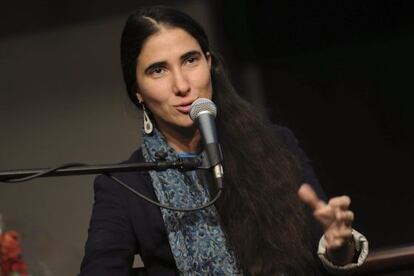Cuban blogger Yoani Sánchez takes the US stage
Dissident receives Cabot prize she was unable to accept four years ago


The event had been announced discreetly on a whiteboard (“Yoani Sánchez, first words”), but excitement was running high Thursday evening at the entrance hall of Columbia University’s Journalism School, where people had to show ID before being allowed inside. Assistance was limited to Columbia students and faculty, just like another event happening on the third floor with the editor of the US edition of Glamour magazine. Except in this case, the star of the talk was one of Cuba’s most eagerly anticipated figures, someone whose voice leaves almost nobody indifferent.
Five years and nearly 20 official requests later – in what she herself describes as a “personal and professional crusade”- Sánchez, founder of the blog Generación Y, has finally been allowed to travel outside her native island. “Sánchez has managed to send out very realistic descriptions of life in Cuba on her blog, GeneraciónY, and her Twitter feed, which are followed by hundreds of thousands worldwide,” said Columbia in its description of the speaker.
Just a few hours after landing in the US for the first time, fresh off a flight from Mexico, Sánchez arrived at Columbia Journalism School and addressed the audience through her translator for the day, CUNY professor Ted Hanken. Waiting to greet Sánchez were some of the school’s officials, including Dean Nicholas Lemann and Joshua Friedman, director of the Maria Moors Cabot Prizes, who underscored how excited he was about the event. In 2009, Sánchez had received a Special Citation from the jury that awards these prizes, but was not allowed to travel to New York for the ceremony. It is only now, in 2013, that the popular blogger was finally able to personally accept the award for her work documenting the reality of life on the island.
The initial talk with journalist and J-School teacher Mirta Ojito began with a firm statement of purpose by Sánchez, who said that when she returns to Cuba she wants to help found an independent news outlet. “The legal conditions are not there yet, but I believe that the time has come to move on from a personal and individual exercise like the blog, and the 140-character catharsis of Twitter, to a collective medium. It would be a digital medium, but the day after change arrives, it would be ready to be delivered into the hands of Cubans.”
The internet throws the government into a panic”
Yoani speaks in a mild tone, yet her voice is filled with resolve. One by one, she listed the peculiarities of news reporting in Cuba: she talked about the journalist Calixto Ramón Martínez, who broke the story about an outbreak of cholera on the island and has been in jail for the last six months, pending trial; she discussed censorship and prison, two fates that await all news professional in Cuba; she also explained how Cubans manage to stay informed in creative ways, “becoming internet specialists without the internet.”
Often enough, USB memory drives containing relevant webpages are passed from one person to another. “If someone wants to find you, they will,” she said, adding that it is impossible to put a figure on how many people make use of this grassroots technique.
“The internet throws the government into a panic,” the blogger added. A system based on information control, she noted, could not survive the avalanche of information provided by the world wide web, and it was the new technologies that first opened a breach in that iron-fisted control. On other occasions, people’s private living rooms double as improvised movie sets where Cuban civil society creates television programs that “spread like the flu,” in Sánchez’s words.
Among all the soap operas and other forms of entertainment recorded on hard drives, which also get passed from one person to the next, there is the occasional unexpected “hit” like the documentaries Corea del Norte, acceso al terror (or, North Korea, gateway to terror) and Stalin la amenaza roja (or, Stalin the red peril), together with nearly 20 episodes from a series about the Cold War.
The Cuban government’s reaction to bloggers, she said, has gone through different phases: first, it ignored them completely - then it accused its authors of having been trained in labs run by the Pentagon. It was a similar reaction to Castro’s attitude towards the independent press of the 1980s, yet Yoani Sánchez sees reason for hope this time around: it could be the first step towards acceptance, since not only are bloggers like herself being widely read, but there are also scores of Twitter users who engage in online exchanges with people like her. The Arab Spring, she added, was closely followed by the Cuban government and by those who, like herself, are battling the government’s censorship.
Only Columbia students were allowed to ask questions, and these ranged from how people can help from exile to what kinds of mistakes the foreign media makes when it reports on Cuba, or what contradictions Sánchez has observed on her visit abroad. Yoani said that two ways in which people could help is through technology – anything from retweets to devices that connect to the internet – and by refilling the cellphone cards of Cuban Twitter users (they send their messages through SMS, whose price is over a dollar). Freedom of speech, she said, is what would enable reporters to denounce other human rights violations. As for the foreign media’s mistakes, she cited the folksy angle of certain articles about her country. Of her first flight out of the island, bound for Panama, she said that she had felt like a time traveler, heading towards the future that awaits Cuba.
Although Sánchez’s comments were met with widespread acceptance, there was the odd dissenter in the audience. Toward the end, a woman got up and started reading out 40 questions from some of Yoani Sánchez’s opponents (“In Brazil there were 50, so they’ve taken off 10,” Sánchez joked), but applause from the rest of the room silenced her. As Sánchez was being escorted out with a bouquet of flowers in her arms, another opponent held up a sign accusing Sánchez of being “cheap press, not free press.”
In the coming days, Sánchez is scheduled to give talks at other New York centers of higher education like NYU and CUNY, where she is likely to run into similar confrontations. As the blogger herself said, there can be no question that Cuba is a topic which arouses passions on either side.
Tu suscripción se está usando en otro dispositivo
¿Quieres añadir otro usuario a tu suscripción?
Si continúas leyendo en este dispositivo, no se podrá leer en el otro.
FlechaTu suscripción se está usando en otro dispositivo y solo puedes acceder a EL PAÍS desde un dispositivo a la vez.
Si quieres compartir tu cuenta, cambia tu suscripción a la modalidad Premium, así podrás añadir otro usuario. Cada uno accederá con su propia cuenta de email, lo que os permitirá personalizar vuestra experiencia en EL PAÍS.
¿Tienes una suscripción de empresa? Accede aquí para contratar más cuentas.
En el caso de no saber quién está usando tu cuenta, te recomendamos cambiar tu contraseña aquí.
Si decides continuar compartiendo tu cuenta, este mensaje se mostrará en tu dispositivo y en el de la otra persona que está usando tu cuenta de forma indefinida, afectando a tu experiencia de lectura. Puedes consultar aquí los términos y condiciones de la suscripción digital.








































